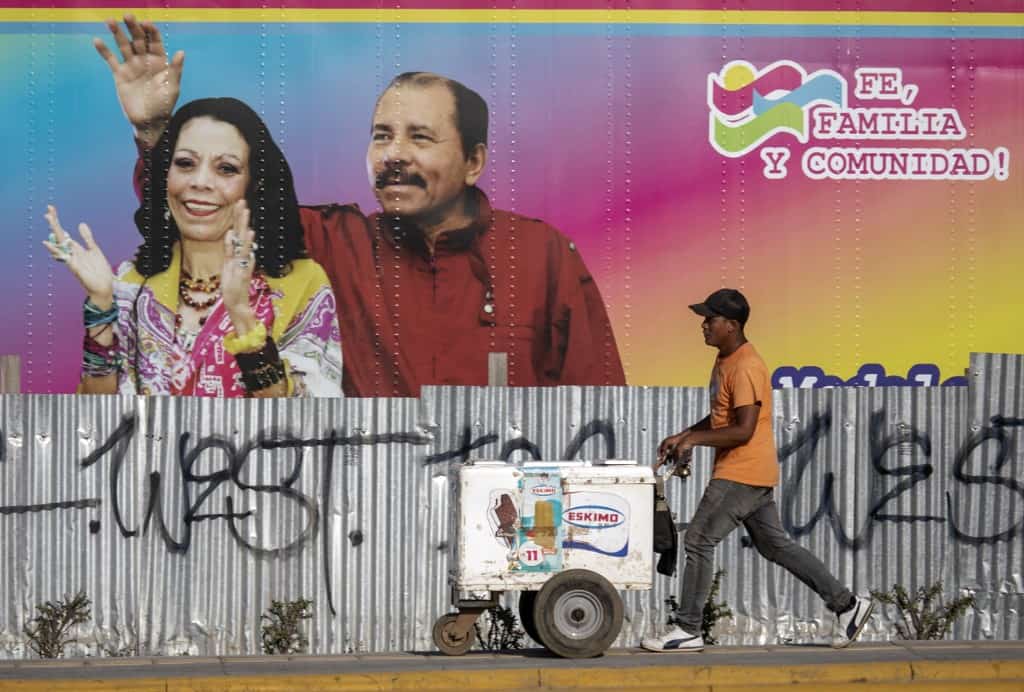Earlier this week, Nicaragua finished sentencing 45 opponents of President Daniel Ortega’s government to up to 13 years in prison for allegedly “undermining” national security.Their supporters have denounced political persecution, but some experts believe former guerrilla leader Ortega is hoping to use the sentences as a bargaining tool to lift international sanctions.
“Ortega is closing the cycle of false legality that he wants to give this. Now he will want to negotiate political prisoners in exchange for (sanctions) concessions,” former opposition legislator Eliseo Nunez, who lives in exile, told AFP.
Among those convicted is journalist Cristiana Chamorro, 68, the daughter of former president Violeta Barrios de Chamorro who defeated Ortega at the polls in 1990.Others include Ortega’s former comrades in arms at the Sandinista National Liberation Front, such as Dora Maria Tellez.
It would have been 46 opposition figures but Hugo Torres, a harsh critic of the president, died in February before being sentenced.Most of those jailed were prosecuted for offences under a 2020 law allegedly defending sovereignty, which makes it illegal to promote sanctions, foreign interference and attacks against national security.
The United States first imposed sanctions on Ortega and his inner circle in 2017. The law’s detractors say it has been used to silence Ortega’s critics and prevent any meaningful competition from running against him in last November’s election.
Ortega has accused them of conspiring with Washington against his government while his vice-president wife Rosario Murillo described them as “devils.”
Violations of basic due process
The European Union, US and Organization of American States (OAS) have joined family members in denouncing an attack on democracy.The arrests began in June 2021 and included seven presidential hopefuls, including Chamorro, who was leading polls but has been sentenced to eight years of house arrest.
“It is amply clear that the pre-candidates were detained so that there would be no real elections,” said former guerrilla Monica Baltodano.The arrests allowed Ortega to “create a purse of personalities: human rights defenders, political analysts directors of social organizations.”
The trials took place behind closed doors at a notorious prison in Managua known as “El Chipote.”Family members said the cells were “punishment” facilities in which many detainees suffered health problems.
Congress, which is controlled by Ortega’s FSLN party, has said it will look into increasing these sentences to 20 years.”The trials were plagued by violations of the most basic guarantees of due process. It is the culmination of a brutal dictatorship,” said Juan Pappier, from the Americas division at Human Rights Watch.
Prisoners as ‘currency exchange’
Since the end of 2017, the United States has imposed sanctions on 46 people and nine entities in Nicaragua, including various members of the Ortega-Murillo clan.Washington has also revoked the visas of 280 Nicaraguans. But Emily Mendrala, the US State Department’s deputy assistant secretary for the Western Hemisphere, says that communication lines are open between the two countries, and Washington’s priority is “the immediate release of political prisoners held by the regime.”
A Nicaraguan NGO campaigning for political prisoners says there are 182 opposition figures held in the country.Nunez says Ortega will use those prisoners as “currency exchange.
He will look (to negotiate) directly with the US.”Ortega’s plan is for everything to return to normal with just the release of political prisoners, but not even the 180-odd, just the 40-odd, and in return they recognize his government and lift the sanctions,” said Nunez.
The last sentences were handed down on Tuesday to businessmen Michael Healy and Alvaro Vargas, given 13 and nine years respectively, Nicaragua’s CENIDH human rights center said.The arrests allowed Ortega to “create a purse of personalities: human rights defenders, political analysts directors of social organizations.”






